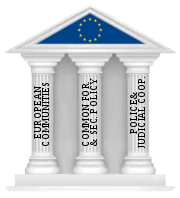Justice and Home Affairs
|
|
Police and Judicial Co-operation in Criminal Matters (PJCC) was the third of the three pillars of the European Union (EU). It was named Justice and Home Affairs (JHA) before 2003. The pillar existed between 1993 and 2009, when it was absorbed into a consolidated European Union structure and became the area of freedom, security and justice.
The pillar focused on co-operation in law enforcement and combating racism. It was based more around intergovernmental cooperation than the other pillars meaning there was little input from the European Commission, European Parliament and the Court of Justice. It was responsible for policies including the European Arrest Warrant.
It was created, on the foundations of the TREVI cooperation, as the Justice and Home Affairs pillar by the Maastricht treaty in order to advance cooperation in criminal and justice fields without member states sacrificing a great deal of sovereignty. Decisions were taken by consensus rather than majority (which was the case in the European Community areas) and the supranational institutions had little input.
The Treaty of Amsterdam transferred the areas of illegal immigration, visas, asylum, and judicial co-operation in civil matters to the integrated European Community. The term Justice and Home Affairs later covers these integrated fields as well as the intergovernmental third pillar. The pillar was renamed "Police and Judicial Co-operation in Criminal Matters" to reflect its reduced scope.
...
Wikipedia


